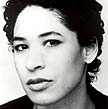 |
P.O.V. kicked off the discussion by asking
Rebecca 6 initial questions, the same 6 we are asking all the featured
guests.
P.O.V.: In your work, you consider the notion of 'borders.' What
is a border to you?
Rebecca: A border is a line drawn in the earth or in the psyche
that beckons to be crossed. A border is an invitation to wholeness,
as it marks a place of separation, a wound in need of attention
and repair. A border represents the illusion of separateness. A
teacher once said, "When you look at the earth from space,
do you see streets, cities, states, or countries? No. With the right
perspective, there are no lines, there is no separation." There
are no borders.
P.O.V.: What's an important border that you've crossed in your
life?
Rebecca: As a mixed race person, I have often felt like a bridge
between worlds, a walking frontier. For much of my life I felt pressured
to respect and respond to the external borders, to choose which
side of the fence I was on — the racial fence, the spiritual
fence, the ideological fence. The day I stopped choosing sides and
accepted and embraced all of my complex and complicated self was
the day I became a real human being. I let the internal borders
completely dissolve and began to see the external ones as illusions.
That practice, of accepting and embracing all sides, even the parts
I don't like, is a challenge I try to meet in small ways each day.
Sometimes I fail, especially in these times of war and fear, but
I know my goal.
P.O.V.: If you could erase any border in your
world, what would it be?
Rebecca: I would erase the border between those who have access
to safety, education, health care, and sexual and spiritual freedom
and those who do not. I would erase the border between the powerful
and the powerless, the rich and the poor. Is that too utopic?
P.O.V.: When and how are borders useful?
Rebecca: Um. To manipulate the earth's resources for the benefit
of a few wealthy nations? I am not sure I can come up with a positive
spin on borders. I do like the "border" between the body
and the state, that's a helpful one. I think that it is very important
that women, in particular, have the right to do what they want with
their bodies without being regulated or penetrated or controlled
by the state. So the right to sexual and reproductive freedom is
something that has been won using the idea of a positive border
of sorts. That has been useful.
P.O.V.: This episode of P.O.V.'s Borders concentrates on borders
as a physical reality, in terms of people moving from one place
to another and having to cross mental and literal borders to do
that. What, in your experience, is the most contested border?
Rebecca: I have long felt uncomfortable with the border between
the US and Mexico. The idea that one is US land and the other Mexican
is just so arbitrary. Because you live on one side of a line you
can't have access to what is on the other side of the line? And
why is that only one way? We in the US have free access to Mexico
and its resources but not vice versa? Thousands are killed or detained
for trying to cross the line? It is insanity. Mexico is us and we
are Mexico, I think we should reevaluate our relationship to allow
for more freedom of movement between the countries and thus the
cultures.
And back to the previous question, the border between women's bodies
and the arms of the church and state is one that has been contested
and will continue to be as our government gets more and more conservative
and fundamentalist. We will need to defend this border, even though
what this struggle really points to is how much needs to be healed
in the relationship between male and female, masculine and the feminine,
born and unborn.
P.O.V.: Expand our borders. What's a book, movie, piece of music,
website, etc. that challenges or engages with the idea of 'borders'
that we should know about but perhaps don't?
Rebecca: I love the work of Bill
Viola, who often works at the boundary between the material
and the nonmaterial. His huge floor to ceiling video installations,
like my favorite of a man walking in real time into a fire, challenge
the division between life and death, body and spirit. His work collapses
that boundary somehow, and takes us through it experientially.
Both of my books are about border crossing, and so is the novel
I am working on at the moment. I think those of us who try to imagine
living in ways that are not defined by opposition to a bad Other,
that have open borders, are planting the seeds for a peace that
we will not see in our lifetime but which will flower once the cycles
of war and domination are clearly seen as insane.
|
 |
 |


![]()






